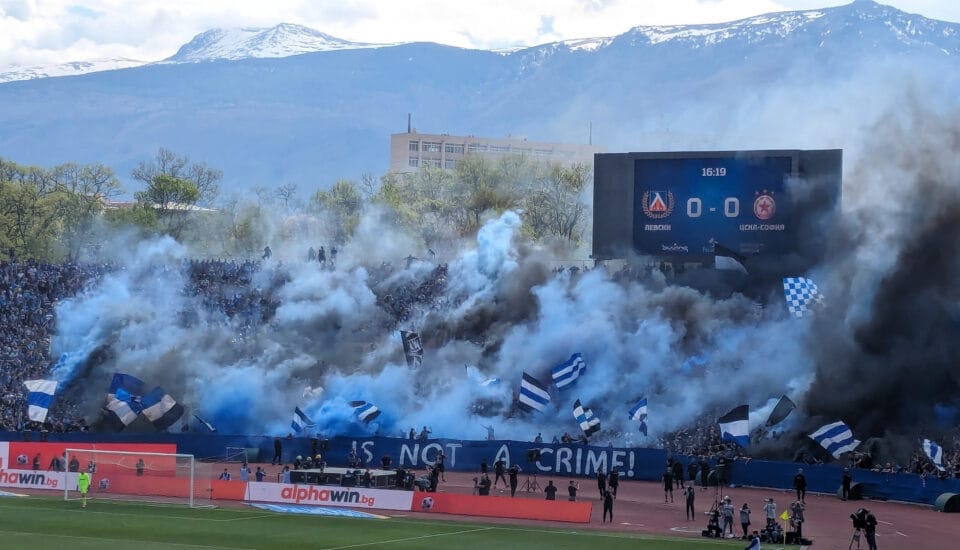eternal: lasting forever
1. : having no beginning and no end : lasting forever. eternal bliss. 2. : continuing without interruption.
The Sofia derby, is another (yet another) of those fixtures called the eternal derby. Rome, Tirana, Belgrade, Istanbul, the number of eternal derbies is uncountable particularly in the more southern areas of Europe.
Hatred, unfortunately, can also be eternal – namely there is no love lost between these two sides and the supporters of both and it wont ever go away. Its not so much a question of love lost or divorce more a lifetime of dislike.
In the lead up to the game a huge cache of rockets and explosive devices was seized. Flares, explosive bombs, smoke bombs and even improvised explosive pyro that could be launched into opposing supporters at a rate of 32 rounds a minute were found.
CSKA fans asked for carnage at the start of this game and it turned out that this was pretty much the case.
Levski Sofia v CSKA Sofia
Vasil Levski Stadium, Sofia – Bulgaria
Sunday 7th April, 2024
Parva Liga (Bulgarian First League)
Referee: Dragomir Draganov
In its 75-year history CSKA has always been a regarded as a military club.
Memorable matches in Europe and multiple domestic titles have been won – the club were officially established on 5th May 1948.
But CSKA’s roots date back to an army officers’ club founded in 1923 – ‘Officers’ Sports Club Athletic Slava 1923‘, when they were under the patronage of the Ministry of War.
More name changes followed with the ‘CSKA’ title coming in the 1960’s – when the Central House of the People’s Troops ceased its affiliation with the club, and they were taken over by the Ministry of People’s Defence.

The biggest change for both rivals came in 1985 even if it was short lived.
In 1985, the club was disbanded and renamed Sredets and then a few years later ‘CFKA Sredets’.
The great drama of the name change occurred thanks to a Bulgarian Cup final in 1985. Tensions boiled over, something that left the Bulgarian Communist party Committee outraged.
The game ended with fighting, physical attacks on the referee and disagreement between the two rival club officials.
By a decision of the Central Committee of the Communist Party the two teams were disbanded along with many players who were stood down from playing duties.
The team name Sredets was chosen for CSKA as it was the medieval name of the city of Sofia – which literally means ‘in the middle‘ of Bulgaria.

Sports Club Levski meanwhile had been named in honor of the Bulgarian revolutionary Vasil Levski; being officially registered as a club on 24 May 1914.
However, thanks to the chaos at the 1985 Final, Levski became ‘Vitosha’ – like CSKA they were disbanded by the communists and named after the symbolic mountain that overlooks the Bulgarian capital.
Eventually the team name changes were overturned. While many of those who went on to represent Bulgaria at the Mexico 1986 World Cup did so as Sredets and Vitosha players the episode was a temporary if shameful chapter in the history of both clubs.
Redemption for the players meanwhile was sealed by 1992 with Hristo Stoichkov, by then, a European Cup winner with FC Barcelona. By the 1994 World Cup in the USA two of the main protagonists in that 1985 final were stars of the Bulgarian national team – that man Stoichkov once of CSKA and Borislav Mihaylov of Levski.
In recent years matches between Levski and CSKA have been held at a neutral venue.
In most cases the derby takes place at the Vasil Levski National Stadium where the Bulgarian national team plays its home fixtures.
The location is suitable for both sets of fans with the Balgarska Armia stadium of CSKA sitting adjacent to the national stadium in the centre of Sofia.
The higher capacity, meanwhile, allows more supporters from both clubs to congregate. Its the choice of local police allowing tensions between the two to be maintained more easily both before and afterwards.
With a 14:45 kick off the proceedings took place on a warm and sunny spring afternoon.
The snow capped Vitosha mountain overlooked proceedings – a symbolic reminder perhaps of that name change in 1985.
It was two players – Tobias Heintz (on 61′ minutes) and Fernando Karanga (on 77′) who gave CSKA a well deserved win. The work from the players that went on during the game to earn CSKA the points was praiseworthy.
This was a hard fought win in a cauldron of noise and the tensions were high throughout. But the 12,000 CSKA fans who congregated on one side of the pitch generated a very special atmosphere well worthy of the carnage this derby is known for.
As for the Levski fans the tensions bubbled all the way through and ill feeling to the club hierarchy is said to be near to breaking point. CSKA (about to embark on a period of infrastructural change) know the story having been in the same boat not so long ago and let Levski know.
Carefully choreographed displays were organized and rolled out with meticulous detail – the engagement from the whole CSKA fan base in every part of the stadium was perfect.
Levski fans, in fairness were equally passionate, even if a few heads were lost in the last 15 minutes as CSKA rejoiced in this crucial derby win.
FT: 0-2
Attendance: 30,000



